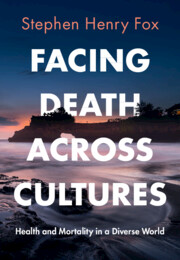Book contents
- Facing Death Across Cultures
- Facing Death Across Cultures
- Copyright page
- Dedication
- Contents
- Figures
- Tables
- Acknowledgments
- Introduction to a Cultural Species
- Module 1 The Basic Psychological Components of Culture
- Module 2 Becoming Human
- Module 3 Acculturation
- Module 4 Multicultural Adaptation
- Module 5 Health and Well-Being
- Module 6 Disease and Healing
- Module 7 Diversity and the Conventional Medical World
- Module 8 Thinking about Death
- Module 9 Managing Mortality and Difficult Passages
- Module 10 Cultures Approach the End
- Module 11 Critical and End-of-Life Care
- Module 12 Culture, Passages, and Psychosocial Supports
- Glossary
- References
- Index
Module 9 - Managing Mortality and Difficult Passages
Published online by Cambridge University Press: 20 February 2025
- Facing Death Across Cultures
- Facing Death Across Cultures
- Copyright page
- Dedication
- Contents
- Figures
- Tables
- Acknowledgments
- Introduction to a Cultural Species
- Module 1 The Basic Psychological Components of Culture
- Module 2 Becoming Human
- Module 3 Acculturation
- Module 4 Multicultural Adaptation
- Module 5 Health and Well-Being
- Module 6 Disease and Healing
- Module 7 Diversity and the Conventional Medical World
- Module 8 Thinking about Death
- Module 9 Managing Mortality and Difficult Passages
- Module 10 Cultures Approach the End
- Module 11 Critical and End-of-Life Care
- Module 12 Culture, Passages, and Psychosocial Supports
- Glossary
- References
- Index
Summary
Death must be managed, cognitively, so that we can function, and practically, to maintain the health of the living. Deaths happen in predictable patterns, once diagnosis is made; it may be fast, slow, or halting in its progression, and chronic conditions may take years for eventual decline. These can be described as dying trajectories and cultures usually have expectations based on scripts derived from worldview, experience, and health epistemology. Communicating across cultures brings challenges of language, but also of worldview and expectations. Relaying the bad news of a terminal diagnosis is never easy, but becomes even more difficult if a culture has proscriptions against mention of death. Informed consent becomes particularly burdensome when patients’ cultures are more collectivistic and/or agency is not individualized. Arts provide fertile bodies of information about how cultures think about and approach mortality.
- Type
- Chapter
- Information
- Facing Death Across CulturesHealth and Mortality in a Diverse World, pp. 175 - 193Publisher: Cambridge University PressPrint publication year: 2025

